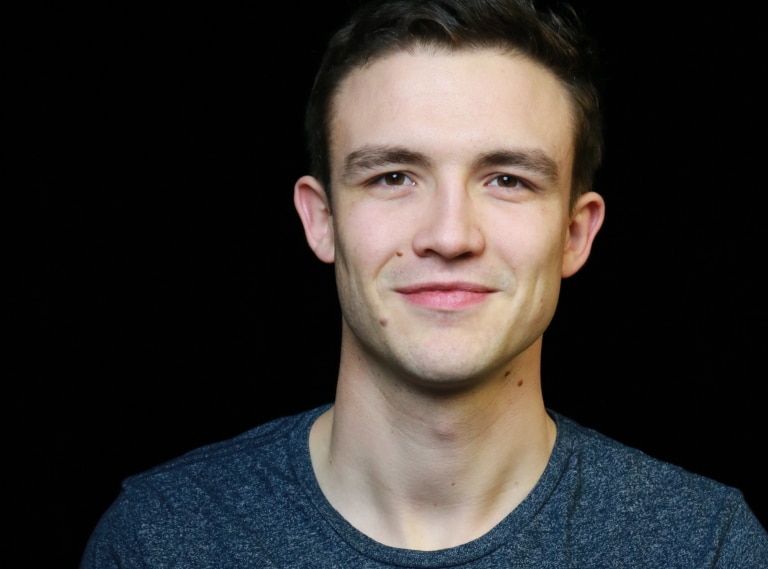
Jake Nielen is revelling in his role within an industry enjoying explosive growth and operating at the forefront of a technological revolution.
Jake (OE 2004–2011) is a London-based account manager with Amazon Web Services, helping financial technology (FinTech) startups rapidly achieve global scale and huge customer growth through applying artificial intelligence (AI) and machine learning (ML).
On graduating from Cambridge, he joined Egon Zehnder, a top-three executive search firm focused on board-level appointments for FTSE 100 and Fortune 500 customers.
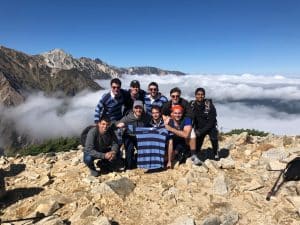 “After two years working across various industrial and financial services clients, I moved to do the same role at Amazon, ultimately specialising in finding and convincing some of the best technical minds around the world to build some of the largest distributed technical systems in the world, and solve some of the hardest AI/ML challenges across Amazon Retail, Amazon Prime Video, Alexa, Amazon Web Services (AWS), and even Amazon’s Operations business.
“After two years working across various industrial and financial services clients, I moved to do the same role at Amazon, ultimately specialising in finding and convincing some of the best technical minds around the world to build some of the largest distributed technical systems in the world, and solve some of the hardest AI/ML challenges across Amazon Retail, Amazon Prime Video, Alexa, Amazon Web Services (AWS), and even Amazon’s Operations business.
“Whilst in that role it became obvious that AWS was exploding in terms of growth. It currently stands at $36bn revenue globally, growing at 36% year-on-year, which has never been done before in the history of technology services. (We have 19k in the sales team with 12k open roles for next year!).
“In addition to that, we are adding a new feature or product every three hours (2500-plus last year alone), and the pace of change and ability to work in an industry that is revolutionising and democratising how millions of customers around the world consume and process data was too good to pass up.
“I’ve since joined the Startups team, focusing on helping FinTech customers (Monzo, Transferwise, Nutmeg, etc.) get the best out of our services and support those types of customers as they scale globally and offer new services to millions of new customers around the world.”
 Among highlights from earlier in his career he would include working on the process to appoint the new Chairman of the Government-owned Royal Bank of Scotland. Another was rebuilding the Prime Video technical leadership team, which last year launched live-streaming of the Premiership in the UK.
Among highlights from earlier in his career he would include working on the process to appoint the new Chairman of the Government-owned Royal Bank of Scotland. Another was rebuilding the Prime Video technical leadership team, which last year launched live-streaming of the Premiership in the UK.
“More recently, it has been helping two of my customers win deals with FTSE 100 businesses and supporting [banking start-up] Tide to grow to over 100k small-business users in the UK as well as [helping them towards] international expansion in the near future.”
At School, Jake was a notable sportsman, playing for the First XV and also involved in athletics, water-polo and cross-country.
He vividly recalls “the trials and tribulations of the U16 Sevens and XV rugby teams – the wins and losses and the team-building that came about as a result of an ‘aggressive’ fitness regime based on a strategy that if we couldn’t run through or round our opponents, we would just have to run further and work harder”.
“More generally, I’ve got good memories of constantly being flagged down in the corridor for having my top button undone, the pain of the ‘elephant dip’, the relentless number of A3 grids in Geography.” He confesses to having occasionally been guilty of putting off difficult homework – “deferring it all to an hour before and having to work in the atrium on top of the lockers”.
“But,” he says, “most of all, I have good memories of the dedicated teaching staff who worked above and beyond to provide a top-tier education to anyone, regardless of background, for free.”
He especially praises current Headmaster Neil Enright, who taught him Geography, and his form teacher, Tahmer Mahmoud. Jake, who went on to take a First in Geography at St Catharine’s College, continues to apply Mr Enright’s “organisational capabilities and standards” to this day. “I still colour-code and underline headings on my work.”
“Mr Mahmoud…taught me to intellectually stretch myself to think bigger during form time (‘If you drop a ball, how can you be sure it will always fall to the ground? On what basis do you think the colour red looks the same for you as it is for me?’).”
At Cambridge, his dissertation was on community perceptions of volunteer ‘gap year tourists’ in Ethiopia (“which I loved”).
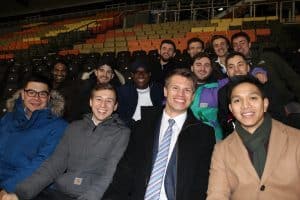 He remains close friends with a group of OEs – “essentially everyone you see in this picture” [right], taken at Allianz Park, home of Saracens, for the QE First XV’s match against Haberdashers’ Aske’s Boys’ School in 2017. Old Elizabethans pictured are top row, left, to bottom right: Alex Grethe, Jake, Anton Bridge, Ioannis Loupas (all 2004-2011); Anoop Raghaven and Max Hassell, (both 2002–2009); Alvin Bombo (2002–2007); Gideon Levitt (2004–2011); Aaron Levitt (2002–2009); Matteo Yoon, Adam Kuo, Alex Goring (all 2003–2010), and Francis Vu (2000–2008).
He remains close friends with a group of OEs – “essentially everyone you see in this picture” [right], taken at Allianz Park, home of Saracens, for the QE First XV’s match against Haberdashers’ Aske’s Boys’ School in 2017. Old Elizabethans pictured are top row, left, to bottom right: Alex Grethe, Jake, Anton Bridge, Ioannis Loupas (all 2004-2011); Anoop Raghaven and Max Hassell, (both 2002–2009); Alvin Bombo (2002–2007); Gideon Levitt (2004–2011); Aaron Levitt (2002–2009); Matteo Yoon, Adam Kuo, Alex Goring (all 2003–2010), and Francis Vu (2000–2008).
“The other photos show us all wearing our QE First XV tops in Japan when we went to visit for the Rugby World Cup.”
Jake’s ambition is, he says, “to continue to learn and always be curious, to push myself out of my comfort zone every day, and to continue to do the hard things well. I’ll probably stay at AWS until I come across a Fintech that seems interesting enough to leap in to (in the interests of being curious).”

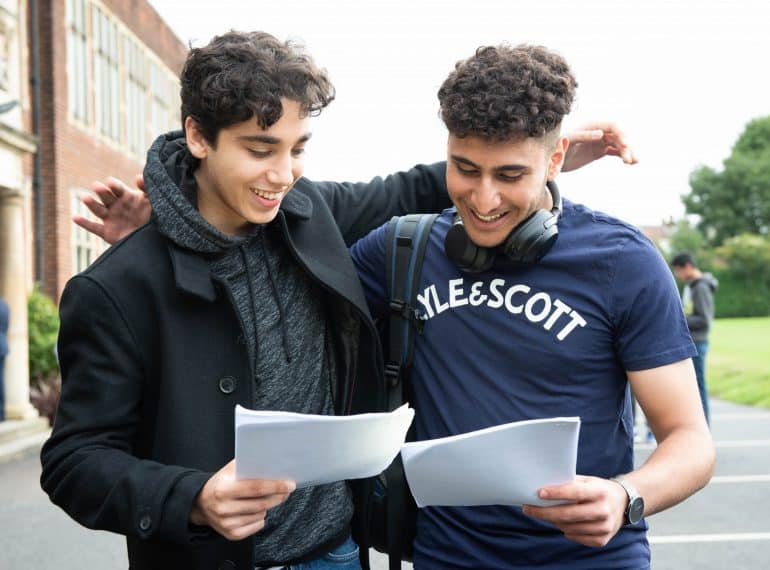
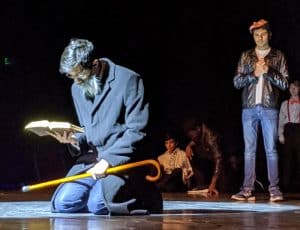 In fact, Parent Power revealed that not only were we the top state school, but were among a mere handful of top-performing schools of any stripe, selective or comprehensive, state or fee-paying. Nationwide, just four independent schools matched QE’s 95.7% figure for the proportion of A-levels passed at A*-B. Remarkable as our boys’ performance this summer certainly was, there is a further aspect that is not apparent from the league tables, and that is the extraordinary long-term consistency in our A-level results: 2019 was the 14th consecutive year in which the A*-B figure has remained above the 95% threshold.
In fact, Parent Power revealed that not only were we the top state school, but were among a mere handful of top-performing schools of any stripe, selective or comprehensive, state or fee-paying. Nationwide, just four independent schools matched QE’s 95.7% figure for the proportion of A-levels passed at A*-B. Remarkable as our boys’ performance this summer certainly was, there is a further aspect that is not apparent from the league tables, and that is the extraordinary long-term consistency in our A-level results: 2019 was the 14th consecutive year in which the A*-B figure has remained above the 95% threshold.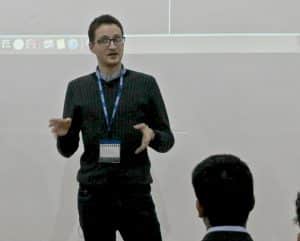 This has been a busy term for Music, and for the arts in general, with a full programme of concerts and performances. Sergio Ronchetti (OE 2004-2011), who is a freelance composer and sound designer enjoying success in the gaming sector, visited to deliver a careers lecture to senior boys. After leaving school, Sergio first worked for four years as a professional musician, only then going to Goldsmiths, where he took a First in Music.
This has been a busy term for Music, and for the arts in general, with a full programme of concerts and performances. Sergio Ronchetti (OE 2004-2011), who is a freelance composer and sound designer enjoying success in the gaming sector, visited to deliver a careers lecture to senior boys. After leaving school, Sergio first worked for four years as a professional musician, only then going to Goldsmiths, where he took a First in Music.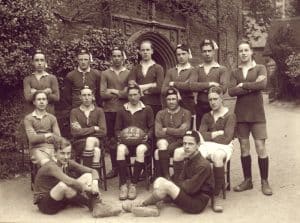 QE recently took on St Albans in a special match marking 100 years since the first encounter between the two schools. The game in 1919, which QE won, was St Albans’ very first fixture, while QE had itself only been playing the sport for a few years. At the centenary match, which St Albans won 36-19, I presented St Albans with this photo (right) of the Elizabethan team from the following season, 1920-21, the earliest rugby team photo that either school possesses.
QE recently took on St Albans in a special match marking 100 years since the first encounter between the two schools. The game in 1919, which QE won, was St Albans’ very first fixture, while QE had itself only been playing the sport for a few years. At the centenary match, which St Albans won 36-19, I presented St Albans with this photo (right) of the Elizabethan team from the following season, 1920-21, the earliest rugby team photo that either school possesses.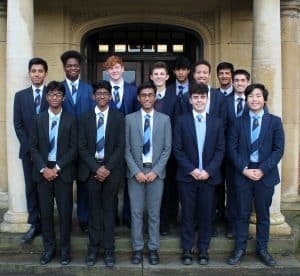 We are now in the last year of the current School plan, covering 2016–2020. It is still proving highly relevant; we continue to actively pursue its aims. For example, it was with Enhancing future prospects in mind – one of the plan’s four priority areas – that we launched our inaugural university mock interview evening, which was supported by a considerable number of alumni.
We are now in the last year of the current School plan, covering 2016–2020. It is still proving highly relevant; we continue to actively pursue its aims. For example, it was with Enhancing future prospects in mind – one of the plan’s four priority areas – that we launched our inaugural university mock interview evening, which was supported by a considerable number of alumni.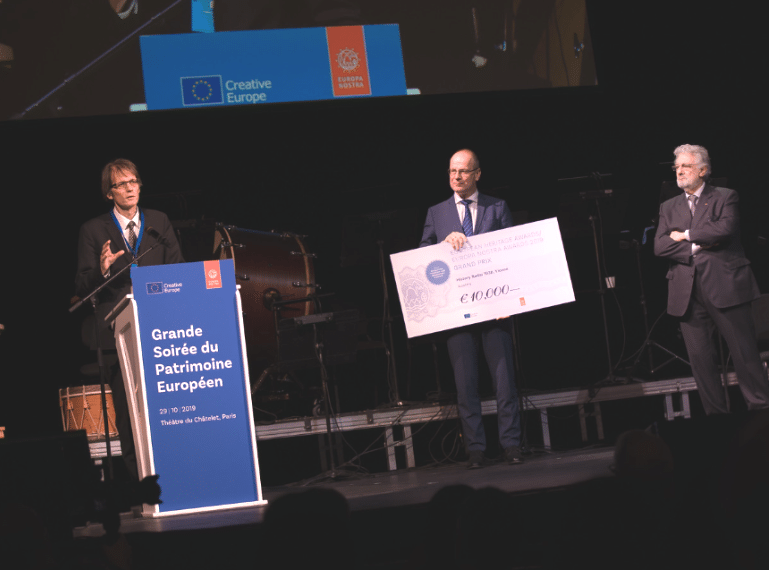
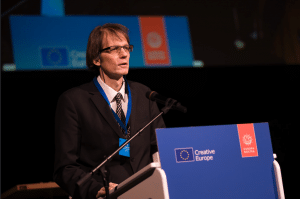 He led a team of filmmakers, historians and programmers involved in the project, which reached thousands of users via the internet, radio, television, and mobile phones, as well as through analogue media such as postcards, lectures, and print. In addition, it was the first digital exhibition on the website of the new Austrian Museum of History in Vienna.
He led a team of filmmakers, historians and programmers involved in the project, which reached thousands of users via the internet, radio, television, and mobile phones, as well as through analogue media such as postcards, lectures, and print. In addition, it was the first digital exhibition on the website of the new Austrian Museum of History in Vienna. Following the success of the project during the 80th anniversary period last year, it was announced this year that it had won the European Heritage Award/Europa Nostra Award in the Education, Training and Awareness-Raising category. The project was one of only seven to be named as one of the awards’ Grand Prix.
Following the success of the project during the 80th anniversary period last year, it was announced this year that it had won the European Heritage Award/Europa Nostra Award in the Education, Training and Awareness-Raising category. The project was one of only seven to be named as one of the awards’ Grand Prix.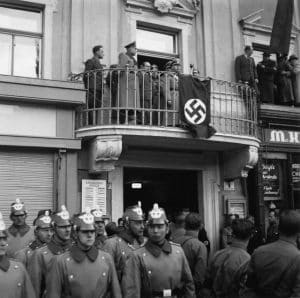 “This project has used innovative media to cast new light on pivotal historical moments in which crucial political decisions were taken. Curiosity was the driving force that provoked this historical storytelling, evoking the collective memory of eyewitnesses. The project’s pioneering technology allows for the constructive mediation of historical events.”
“This project has used innovative media to cast new light on pivotal historical moments in which crucial political decisions were taken. Curiosity was the driving force that provoked this historical storytelling, evoking the collective memory of eyewitnesses. The project’s pioneering technology allows for the constructive mediation of historical events.”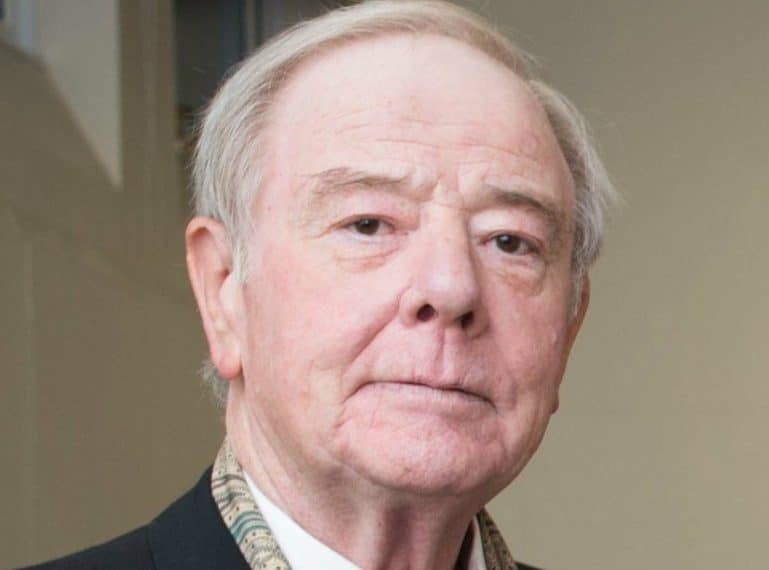
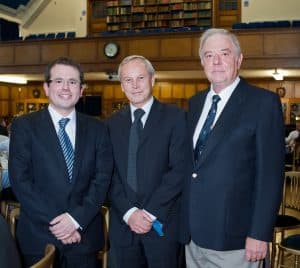 The School is planning to celebrate his life and contribution by hosting a commemorative event on Saturday 21st March 2020, to which all alumni are welcome. Further details will follow in the New Year, but if you are interested in attending, please click the button now to let us know by email – remembering to include your full name.
The School is planning to celebrate his life and contribution by hosting a commemorative event on Saturday 21st March 2020, to which all alumni are welcome. Further details will follow in the New Year, but if you are interested in attending, please click the button now to let us know by email – remembering to include your full name.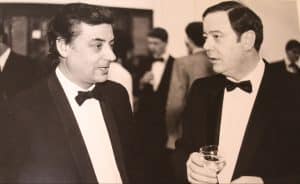 Mr Harris was appointed in October 1983, having taught for ten years at a tough school in Croydon and then at Samuel Whitbread Community College in Bedfordshire, where he was deputy head.
Mr Harris was appointed in October 1983, having taught for ten years at a tough school in Croydon and then at Samuel Whitbread Community College in Bedfordshire, where he was deputy head.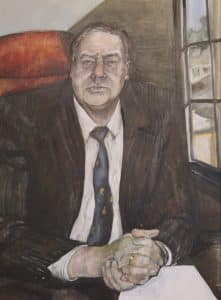 He took a holistic approach to the transformation of the School, combining vision and drive with clarity of thought, a willingness to try new ideas and considerable attention to detail. While there was certainly a focus on teaching and monitoring of performance, ostensibly smaller matters were not neglected, either: uniform policy was, for example, properly enforced, and the School campus was better maintained, with shrubs and flowers planted.
He took a holistic approach to the transformation of the School, combining vision and drive with clarity of thought, a willingness to try new ideas and considerable attention to detail. While there was certainly a focus on teaching and monitoring of performance, ostensibly smaller matters were not neglected, either: uniform policy was, for example, properly enforced, and the School campus was better maintained, with shrubs and flowers planted.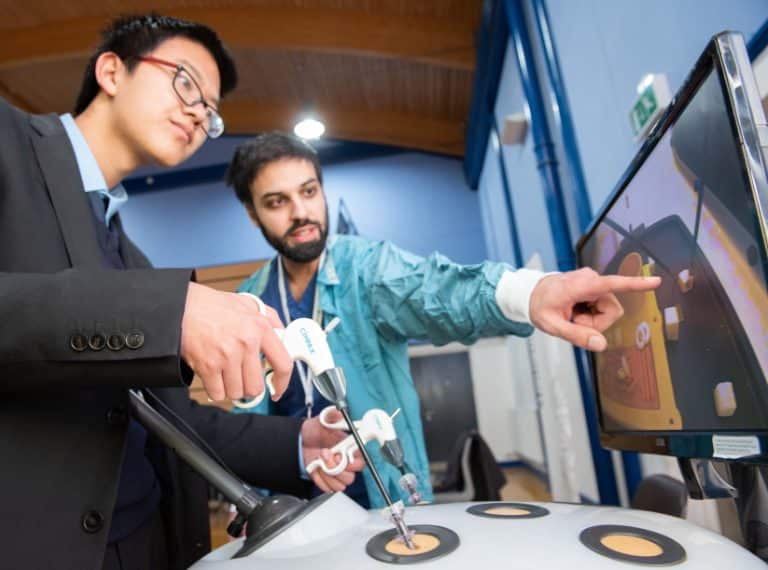
 Representatives from 35 different companies and organisations, featuring a good mix of alumni and other visitors, met boys and their parents as Year 11 were starting to consider their future career paths.
Representatives from 35 different companies and organisations, featuring a good mix of alumni and other visitors, met boys and their parents as Year 11 were starting to consider their future career paths. The main Careers Convention was held in the Shearly Hall, while the nine talks – several of which were repeated three times during the course of the evening – were delivered in classrooms. The talks included popular career areas, such as Dr Nirmal Wilwaraarachchi (OE 1996-2002) on dentistry and Joseph Vinson (OE 2007-2013) on Getting a job in Tech.
The main Careers Convention was held in the Shearly Hall, while the nine talks – several of which were repeated three times during the course of the evening – were delivered in classrooms. The talks included popular career areas, such as Dr Nirmal Wilwaraarachchi (OE 1996-2002) on dentistry and Joseph Vinson (OE 2007-2013) on Getting a job in Tech.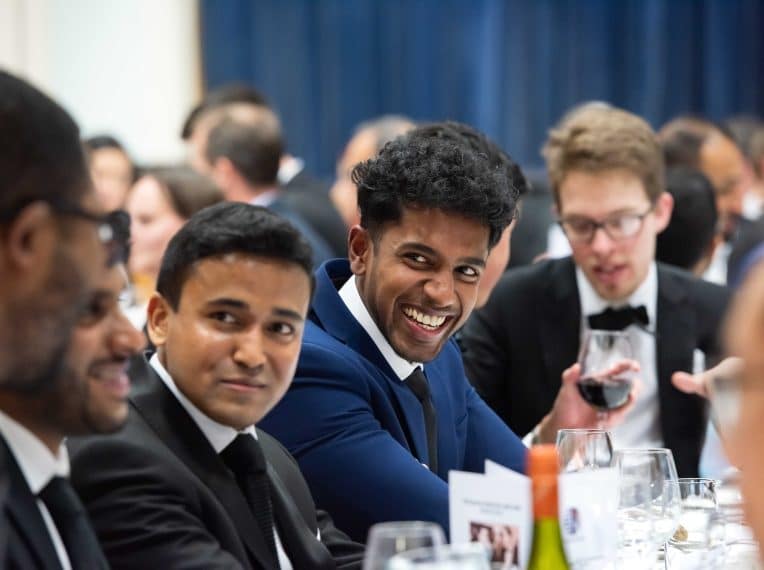
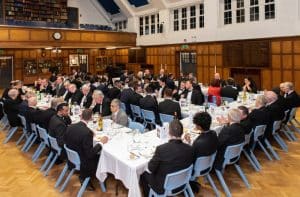 During an evening marked by much convivial chatter and by lively speeches, the diners also observed a silence in memory of former Headmaster Eamonn Harris, one of the great figures in the School’s recent history, who passed away only a few days before the dinner.
During an evening marked by much convivial chatter and by lively speeches, the diners also observed a silence in memory of former Headmaster Eamonn Harris, one of the great figures in the School’s recent history, who passed away only a few days before the dinner.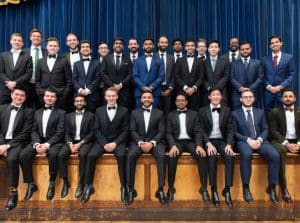 “I’m not, though, surprised to see a good turnout, as they have actually proved to be one of the more actively engaged alumni cohorts and are doing lots of good work in support of the School. They were, and remain (on this evening’s evidence), a very sociable and enthusiastic group, and it is always a great pleasure to have them here at School events.
“I’m not, though, surprised to see a good turnout, as they have actually proved to be one of the more actively engaged alumni cohorts and are doing lots of good work in support of the School. They were, and remain (on this evening’s evidence), a very sociable and enthusiastic group, and it is always a great pleasure to have them here at School events.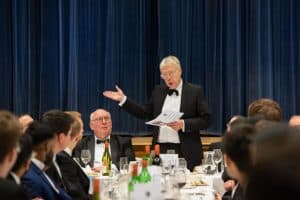 The event in the Main Hall was the first dinner to be hosted by the new President of the Old Elizabethans Association, Eric Houston, who taught at the School from 1976 until he retired, as Second Master, in 2010. Mr Houston is both a Governor and a Foundation Trustee of the School.
The event in the Main Hall was the first dinner to be hosted by the new President of the Old Elizabethans Association, Eric Houston, who taught at the School from 1976 until he retired, as Second Master, in 2010. Mr Houston is both a Governor and a Foundation Trustee of the School. “His bold decision-making, in making the School independent of the local education authority and then restoring academic selection, and the high expectations he had for all in the School community are the bedrocks of our present pre-eminence.
“His bold decision-making, in making the School independent of the local education authority and then restoring academic selection, and the high expectations he had for all in the School community are the bedrocks of our present pre-eminence.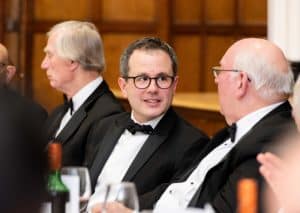 Alluding both to Mr Harris and to Mr Mayes, the Headmaster said: “The present fortunes of the School have been built upon the foundations of the great service given by so many.”
Alluding both to Mr Harris and to Mr Mayes, the Headmaster said: “The present fortunes of the School have been built upon the foundations of the great service given by so many.”